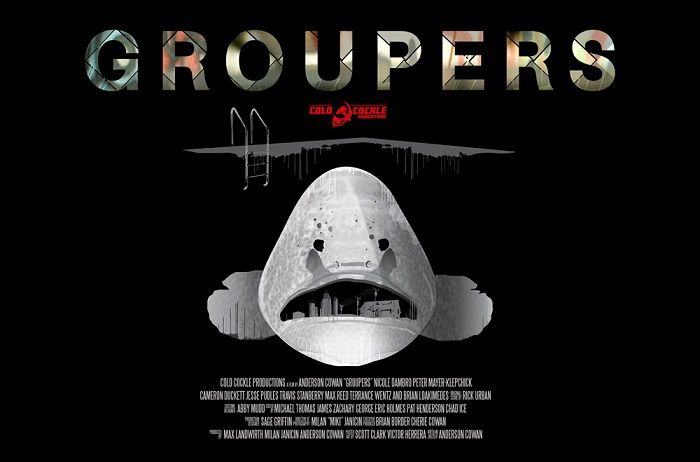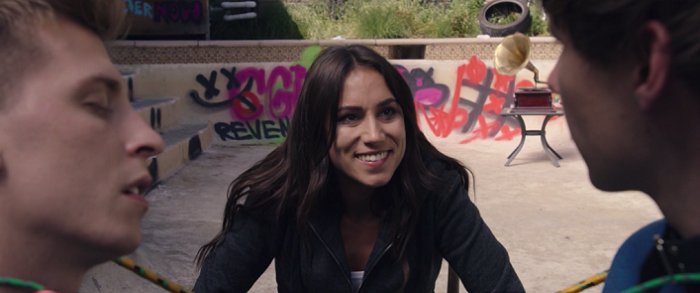
First Comics News: How did you find yourself in the Director’s chair for “Groupers”?
Anderson Cowan: That was the plan from the beginning, to write and direct my own projects. I’ve been with this one since the first page written, through the fundraising, the shoot, the edit and now the publicity. Each phase is incredibly different.
1st: Why make a movie about the subject matter in “Groupers”?
Anderson: A couple reasons. I’ve been covering movies for a living for the past decade-plus, always looking for small movies that are worth talking about and sharing with my audiences on The Film Vault and CinemAddicts. If you make a movie without any names or even faces in the cast then you better have a hook, something that will hopefully lead to a conversation after having seen it. I like to think that anyone who sees this movie is going to want to talk about it with others. So that’s one reason I decided to run with the controversial subject matter, but the better reason is hypocrisy is a lot of fun to expose and call out. Homophobia, in my opinion, often turns out to be quite hypocritical.

1st: What subjects does “Groupers” touch on and how has it been received?
Anderson: Jeeze, what subjects don’t I take a look at? I worked on the nationally syndicated radio program Loveline for many years and heard tens of thousands of calls from troubled young people every night. A lot of that experience stuck with me and has definitely influenced my writing. Drug abuse, relationship issues, bullying, homophobia, gentrification, immediate gratification, graduate studies, revenge, group mentality and squatters rights are among the subjects that make up Groupers.
1st: Do you think the question “Is homosexuality a choice?” controversial?
Anderson: I should hope so. Anyone who actually believes that should really see this movie. I know they’re out there, I’ve had conversations with them. I’ve come to believe that if you think it’s a choice then that probably means you could choose to be gay.
1st: What is the plot in “Groupers”?
Anderson: A young woman named Meg captures these two homophobic jocks and strings them up in the deep end of an empty pool in an abandoned neighborhood. She tells them that they’re part of an experiment that will prove or disprove whether or not homosexuality is a choice. To regain their freedom they have to choose to be gay for each other.
1st: Why call the movie “Groupers”?
Anderson: The title is a bit of a triple entente. The first meaning would be an individual who only hangs out with like-minded people, groups of like-minded people, that echo chamber we’ve all been hearing so much about lately. The secondary meaning is the actual grouper fish which just happens to be a species that changes sexes and sexual orientations throughout its life cycle. Finally, my two lead actors hang slack-jawed in their ropes throughout much of the film with dumb expressions on their faces, not unlike a large bottom-dwelling fish.
1st: What type of person do you think will enjoy “Groupers”?
Anderson: Anyone who has been bullied, picked on or taken advantage of and those who enjoy a good comeuppance. This is the first film in what I’m calling my Comeuppance Trilogy. Homophones get it in this one, pedophiles in the next and then big game hunters in the final installment.

1st: Can you tell us about the main characters in “Groupers” what are their personalities?
Anderson: So we’ve got our protagonist in Meg, played brilliantly by Nicole Dambro. She’s sound enough to be investing in herself by getting her masters degree but crazy enough to kidnap to high school kids to do so. Those two kids are Brad the alpha jock and Dylan his lapdog who follows his every move. Got a couple of stereotypes here, but they’re modeled after some kids I went to school with, I’d think most of us went to school with a couple of these types of bros.
1st: How did you go from wanting to be a Marine Biologist to a Movie Director?
Anderson: Worked for the Cousteau Society for a couple of years just out of high school and desperately wanted to be an Elasmobranchologist which is a fancy term for shark scientist. I was on track to be the youngest Cousteau diver ever when the whole operation went belly up. I was kind of lost at that point in my life. I had always loved movies, I mean really loved them, to the point that I never let myself dream of working in the industry, it almost felt like cheating since I enjoyed them so much. This undoubtedly comes from my German/Irish genes, thought I had to suffer to make a living. Turns out there’s a lot of suffering in this business and I’ve been doing just that for the past couple of decades in trying to get my first feature made.
1st: Can you tell us a little about “Battle at Skunk Skull” and “Everybody Dies”?
Anderson: Oh yeah! “Battle at Skunk Skull” is what I hope to make next. It’s the second film in the aforementioned Comeuppance Trilogy. It’s got a summer camp backdrop and involves three separate groups, the young campers, some juvenile delinquents who are fulfilling a community- service work-weekend a few miles away and an RV filled with pederasts who are tracking the young campers. This one gets pretty nuts and is way more dark and horror driven than Groupers, but with comedic elements for sure, I don’t know how to write anything without levity. God, I hope I get to make that one, there’s stuff in there that every viewer would never forget.
Everybody Dies was the last short I made before Groupers. It’s about the wrong dog being delivered to a visually impaired man by an inept courier service. The blind man is expecting to get his seeing-eye dog but instead receives a vicious and troubled canine. It’s a comedy and everybody that’s in it dies, hence the title. Got to work with Dean Cameron, Chainsaw from Summer School on that one.

1st: What does directing a movie involve?
Anderson: Making thousands and thousands of decisions. From the first words on the first page to casting and crewing up and everything that follows. You need to have a very good idea of what you want the thing you’re making to be. You have to be able to visualize it and hope you make the right decisions along the way. I’ve heard people say “tone management” and I’d have to agree with that as well.
1st: What has been your best experience making films?
Anderson: That’s a tough one. I love the writing process, the creating part and being on set is exhilarating if not the most stressful thing I’ve ever been involved with.
1st: What will you be working on next?
Anderson: That “Battle at Skunk Skull” is what I’d love to dive into next, but I have other scripts that I’ve written that are ready to go as well. I’ll be working on one of those if all goes as planned. If the plan fails I’ll be moving out of state and doing god knows what.
1st: What would you like to say to those who see “Groupers”?
Anderson: I promise you’ll have at least a few laughs and that you won’t soon forget what you see in Groupers. Isn’t that what we’re paying for when we go on vacation, enter a museum or go see a movie, the memories of the experience. In many cases, it’s the memory that lasts much longer than the experience itself. That’s why I think the worst movies are the ones that don’t stick, they go in one eye and out the other. That’s how I look at it anyhow and Groupers has that sticking power.

